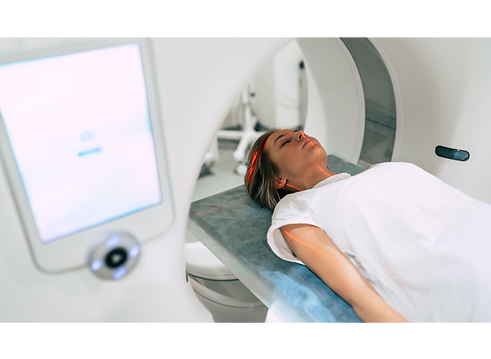2920€
Comprehensive Female Check-Up
The Premium Check-up provides a comprehensive and detailed assessment of your health through expert consultations, advanced imaging technologies, and a wide range of laboratory tests.
This package is specifically designed to detect potential health issues at the earliest stage, allowing for timely intervention and personalized care. With a focus on prevention, it offers a thorough evaluation of your overall health, including key areas such as cardiovascular, neurological, and metabolic functions.
Perfect for individuals who prioritize their health and well-being, the Premium Check-up ensures that you receive a complete, in-depth analysis to guide your health decisions and empower you to maintain optimal health for the future.

Examinations
Radiology Examinations:
Cardiology Examination:
Pathology
.jpg)
• Cervical or Vaginal Cytology (Pap Smear): A Pap smear is a test used to detect abnormal cells in the cervix or vagina that may indicate infections, precancerous changes, or cervical cancer. The test involves collecting cells from the cervix and examining them under a microscope to identify any irregularities. It is an essential screening tool for early detection of cervical cancer.
• Smear Test: A microscopic examination of cervical cells to identify precancerous changes and infections.
• Special Staining (Histochemistry): Advanced staining of tissue samples to identify specific components, aiding in the diagnosis of diseases like cancer.
Gastrointestinal Examinations

• Colonoscopy (ileocolonoscopy): Examination of the large intestine to detect polyps, inflammation, and other abnormalities.
• Upper Endoscopy (esophagogastroduodenoscopy): Examination of the esophagus, stomach, and duodenum to detect ulcers, inflammation, and reflux disease.
• Colon Biopsy: Tissue analysis to diagnose intestinal diseases and cancer.
• Stomach Biopsy: Tissue analysis to detect infections, tumors, or other abnormalities in the stomach.
• Sedative Analgesia: Pain management and comfort during endoscopic procedures.
Tumor Marker Tests

-
AFP (Alpha-Fetoprotein)
A protein that can indicate liver cancer or certain germ cell tumors. -
CA 15-3
A marker used to monitor breast cancer. -
CA 19-9
A marker used to detect pancreatic and gastrointestinal cancers. -
CA 125
A marker used to monitor ovarian cancer. -
CEA (Carcinoembryonic Antigen)
A marker used to monitor colorectal and other cancers.
Laboratory Tests:

-
Albumin (serum)
Measures protein levels in the blood, indicating liver and kidney function and nutritional status. -
ALP (Alkaline Phosphatase)
Assesses liver, bone, and bile duct health by measuring enzyme levels. -
Anti-HBs
Checks immunity against hepatitis B virus infection. -
Anti-HCV, total
Detects antibodies against hepatitis C virus, indicating past or current infection. -
Anti-HIV 1/2 + p24 antigen
Screens for HIV infection by detecting both antibodies and viral antigens. -
Beta-HCG
Measures pregnancy hormone levels or detects certain types of cancer. -
CRP, high sensitivity
Detects inflammation and assesses cardiovascular disease risk. -
Iron (Fe)
Measures iron levels in the blood to detect anemia or iron overload. -
Total Iron Binding Capacity (TIBC)
Assesses the blood’s ability to bind iron, helping diagnose iron deficiency or overload. -
Erythrocyte Sedimentation Rate (ESR)
Measures inflammation in the body by assessing how quickly red blood cells settle. -
Ferritin
Measures stored iron levels in the body, useful for diagnosing iron deficiency or overload. -
Phosphorus (inorganic), serum
Assesses bone health, kidney function, and nutrient levels by measuring phosphorus. -
GGT (Gamma-Glutamyl Transferase)
Assesses liver and bile duct function, often elevated in liver disease. -
Glucose, fasting
Measures blood sugar levels after fasting, used to diagnose diabetes or prediabetes. -
HBsAg
Detects the presence of the hepatitis B virus, indicating an active infection. -
HbA1c (Hemoglobin A1c)
Reflects average blood sugar levels over the past 2-3 months, used to monitor diabetes. -
Insulin, fasting
Measures fasting insulin levels to assess insulin resistance or beta-cell function. -
Calcitonin
Measures a hormone produced by the thyroid, useful in diagnosing thyroid cancer or bone disorders. -
Calcium, total, serum
Measures total calcium in the blood, important for bone health, heart function, and nerve function. -
Complete Blood Count (18 parameters)
Provides a comprehensive overview of blood health, detecting conditions like anemia, infections, and blood disorders. -
Cholesterol: HDL, LDL, total
Evaluates lipid levels (HDL, LDL, and total cholesterol) to assess heart disease risk. -
Creatinine, adults (18+ years)
Measures kidney function by assessing waste removal efficiency in the blood. -
Creatinine, urine
Assesses kidney function by measuring creatinine excretion in urine. -
LDH (Lactate Dehydrogenase), serum
Measures tissue damage and can indicate heart, liver, or muscle disorders. -
Parathyroid Hormone (iPTH)
Regulates calcium levels, and elevated levels can indicate calcium imbalance or parathyroid disorders. -
Potassium (K), serum
Measures potassium levels in the blood, important for heart and muscle function. -
Protein Electrophoresis, serum
Separates proteins in the blood to identify abnormal protein patterns linked to diseases like multiple myeloma. -
Total Protein, urine (spot test)
Measures the amount of protein in urine, an indicator of kidney function. -
Total Protein, urine
Assesses kidney function by measuring the overall protein content in urine. -
Total Protein, serum
Measures total protein in the blood, providing information on nutrition and organ function. -
Liver Function Tests: SGOT (AST) and SGPT (ALT)
Assess liver function and detect liver damage or disease. -
Free T3, Free T4, and TSH
Evaluates thyroid function by measuring thyroid hormones (T3, T4) and thyroid-stimulating hormone (TSH). -
Automated Urinalysis
Tests urine for various substances, helping detect urinary tract infections, kidney issues, or diabetes. -
Transglutaminase IgA and IgG
Tests for antibodies related to celiac disease, indicating an immune response to gluten. -
Triglycerides
Measures blood fat levels, useful for assessing cardiovascular risk. -
TSH
Measures thyroid-stimulating hormone levels to assess thyroid function. -
Uric Acid, serum
Measures uric acid levels, high levels can indicate gout or kidney issues. -
Vitamin B12
Measures vitamin B12 levels, which are essential for nerve function and blood cell production. -
Vitamin D (25-hydroxy)
Measures vitamin D levels to assess bone health and immune system function.
.jpg)

![mnei_6e4l_220211[1]_edited.png](https://static.wixstatic.com/media/7b35c8_b404d8248db74197bf17a660c09d2ef1~mv2.png/v1/fill/w_175,h_169,al_c,q_85,usm_0.66_1.00_0.01,enc_avif,quality_auto/mnei_6e4l_220211%5B1%5D_edited.png)
![4337261[1].jpg](https://static.wixstatic.com/media/7b35c8_9cb9ed55d3574ddea59c09ee2ba3fcd9~mv2.jpg/v1/crop/x_0,y_34,w_2000,h_1931/fill/w_175,h_169,al_c,q_80,usm_0.66_1.00_0.01,enc_avif,quality_auto/4337261%5B1%5D.jpg)





